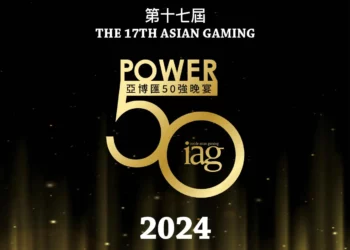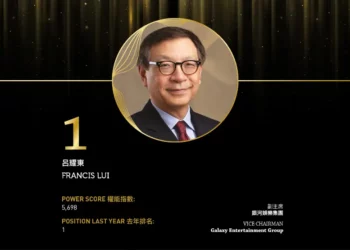[1-10] [11-20] [21-30] [31-40] [41-50]
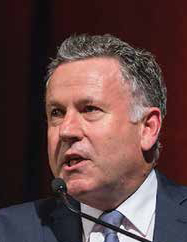
SkyCity Entertainment Group is in capable hands with industry veteran John Mortensen, who took the reins of the six-casino group in April following the resignation of long-time Chief Executive Nigel Morrison.
As Mr Morrison’s Chief Operating Officer, effectively his second in command, he’s well-versed in the practices that are delivering consistently solid revenue and earnings pretty much across the group and which have set it firmly on a path of expansion both in Australia and its home market of New Zealand.
Group-wide EBITDA was up 8.2% to NZ$330 million in the 12 months ended 30 June on normalized revenue that grew a robust 7.6% to NZ$1.1 billion.
One of the real highlights of Mr Morrison’s tenure in this regard has been SkyCity’s emergence as a serious Australasian contender for the VIP trade. “International Business” volume, as the company labels it, was up almost 33% last year to more than NZ$12 billion.
Mr Mortensen certainly will be looking to build on this, and the keys will be keeping two major expansion projects on track: the first, priced at more than NZ$300 million, will bring a new luxury hotel to SkyCity Adelaide along with a lot more gaming product; the second, years in the making, is happening in Auckland, where the company has a deal with the NZ government to build a NZ$450 million convention center and supporting hotel and permission to undertake a significant expansion of the company’s largest casino.
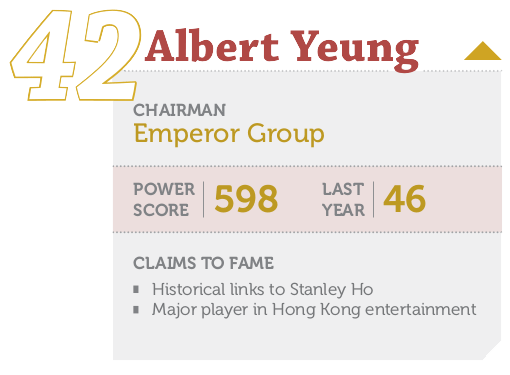
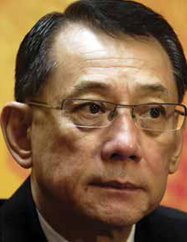
Hong Kong’s eminently creative and well-connected Albert Yeung first got into casinos when Macau was still a Portuguese colony, winning the license in 1993 to develop Vietnam’s first legal gambling hall – in Do Son, a venerable resort town near Hai Phong – which he flipped to Stanley Ho, and venturing a couple of years after that into operations on his own, in North Korea, of all places, opening a casino catering to the Chinese border trade.
He entered the Macau market as an investor in VIP rooms in Mr Ho’s former flagship, the Casino Lisboa, and established himself in operations in 2006 as a sub-licensee of Mr Ho’s Sociedade de Jogos de Macau with the opening of the Grand Emperor Hotel, a 307-room resort with 77 table games and 400 slots that does a tidy business (together with the Inn Hotel Macau in Taipa, formerly the Best Western) that topped HK$1.72 billion in revenue in the financial year ended 31 March.
You can’t miss the Grand Emperor. Its 26 stories tower over a section of downtown not far from the Lisboa. There are always people snapping photos out front, posing around the mock carriage parked there, an ornate, gold-painted model of what European royalty would’ve tooled around in in the bad old days. There are a couple of Caucasians dressed as Coldstream Guards, bearskin hats and all, flanking the entrance. In the foyer the floor gleams with 78 one-kilo gold bars arrayed under plastic.
It’s a nod to the showman in the 73-year-old Mr Yeung, a quality Stanley Ho particularly admired. “No difficulties can baffle him,” he once said of him, “nor are there any hurdles he cannot overcome.”
Indeed, he built a Hong Kong watch retailer’s into an empire consisting of four Hong Kong-listed companies with holdings in property, financial services, retail, mass media, hotels, restaurants and nightclubs. His Emperor Entertainment Group, a major player in the massive Cantopop market, includes a subsidiary in film and TV production with credits that include 2012’s CZ12 starring Jackie Chan (who’s a Grand Emperor investor), 2015’s To the Fore, Hong Kong’s official Oscar entry for Best Foreign Language Film, and the first Chinese film to break US$100 million in mainland China (2010’s Let the Bullets Fly).
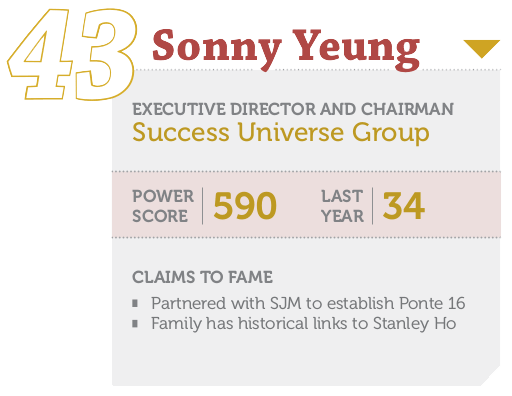
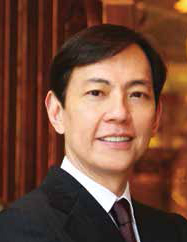
The casino at Ponte 16 is struggling along with the rest of the Macau gaming market during the current downturn, but that doesn’t diminish what Hong Kong financier Sonny Yeung and his Success Universe Group have achieved in their efforts to set the resort apart from most of the casinos that operate as independent contractors under the SJM concession, with their focus on gambling and little else.
SJM owns 51% of the operation, which helps.
Success Universe, for its part, continues to hone an innovative approach to marketing that can be traced to its controlling stake in a Canadian-based travel company that specializes in the high-end MICE and FIT sectors. Highlights at Ponte 16 include a comprehensive tiered loyalty program for both gaming and non-gaming customers and an online magazine and complementary smart phone service for guests at the Sofitel-managed hotel.
Ponte 16 benefits from some unique geography too. As the only casino on the city’s historic Inner Harbour it’s got a sizable footprint, 2.3 hectares in all, which provides space for a more expansive offering than the run of its peers on the Macau peninsula: an outdoor pool, a fitness center and sauna, a L’Occitane-branded spa, nine restaurants, cafes and lounges, seven multi-purpose meeting rooms and extras a peninsula visitor might not expect, like a 1,600-square-meter interactive experience called “Macau 3D World”.
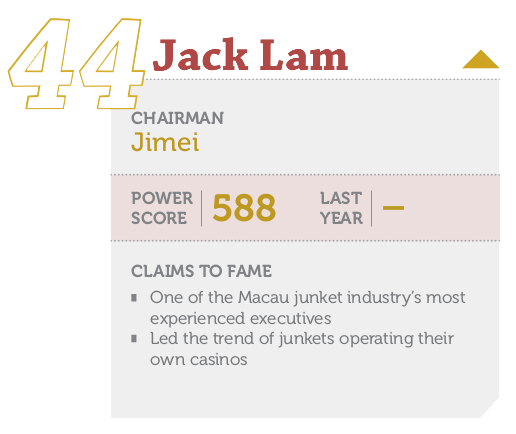
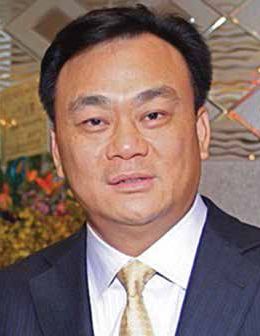
Times may be tough for Macau’s VIP business, but that hasn’t slowed Jack Lam. The Guangzhou-born tycoon, who owns junket operator Jimei Group, has reacted to the sector’s recent plunge by expanding his business to foreign frontiers – most notably Australia.
Through his Hong Kong-listed Jimei International Entertainment Group, Lam signed a junket agreement with Crown Perth in February last year to promote “eight to 10” tables. Three months later a similar deal to operate seven tables was announced with Cambodia’s NagaWorld. And in November Jimei International added The Star in Sydney to its portfolio with a deal to run at least six tables.
That partnership already looks fruitful with The Star out-performing Melbourne rival Crown in VIP revenue for the very first time in the first six months of 2016, bringing in AU$320.5 million – up 7% year-on-year. During that same period, VIP revenue in Macau fell 15.7%.
As Chairman of Jimei Group in Macau, Lam’s interests also extend beyond only junkets. Most prominent of those interests is Jimei Casino, located on the Macau peninsula, which Jimei Group runs under license from SJM.
It also owns and operates the highly successful Fontana Leisure Parks and Casino at Clark Special Economic Zone in the Philippines – a resort on part of the former US Clark Air Force base that is designed like a US suburb.
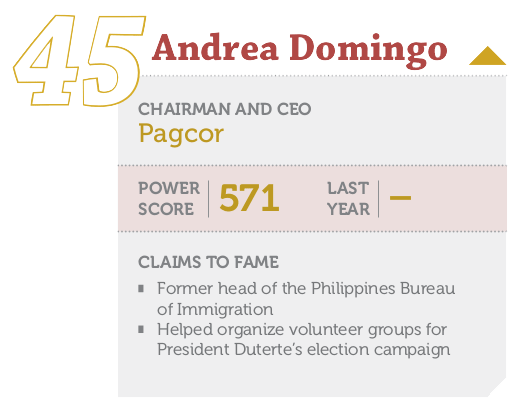
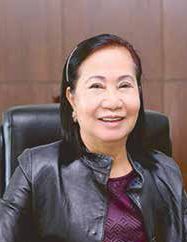
Since she was appointed as the new head of the Philippine Amusement and Gaming Corporation (Pagcor) by President-elect Rodrigo Duterte in May, Andrea Domingo has barely been out of the news.
Domingo replaced Cristino Naguiat in the position, the outgoing Pagcor boss having made considerable progress in improving the Philippines gaming industry’s reputation as well as overseeing the launch of the first two IR’s in Manila’s Entertainment City precinct, Solaire and City of Dreams Manila. But any hopes of a similarly smooth run have already been quashed.
While Naguiat did a respectable job of juggling Pagcor’s duel role as both a regulator and an operator, one of Domingo’s first jobs will be to arrange the sale of the 11 casinos and two dozen smaller gaming venues Pagcor runs across the nation.
It is one of a number of controversial measures ordered by the famously anti-gambling President, with Pagcor’s regulatory arm having previously revoked the licenses of around 200 online gaming companies as well as refusing to renew PhilWeb’s license to provide software to 256 e-Games outlets.
It’s worth noting that in compiling the Asian Gaming Power 50, IAG included Domingo purely in respect to the operational side of Pagcor’s duties – so if the sale of Pagcor properties proceeds this will almost certainly be her one and only appearance.
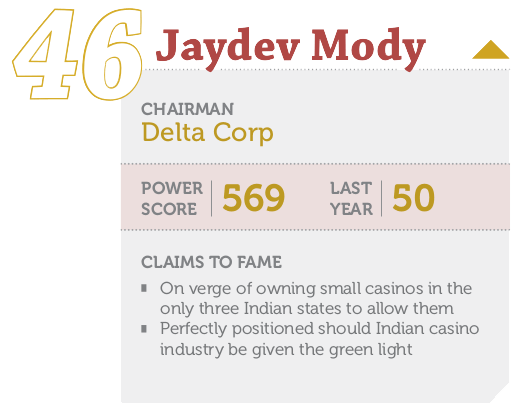
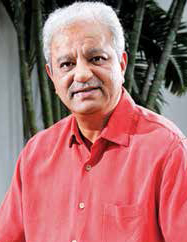
When it comes the world’s gaming melting pots, India is about as unique as they come. Gambling is, for the most part, a heavily restricted industry with casinos allowed in only three of the nation’s 36 states and unions and most only allowed to provide machine-style gaming with no live tables.
Yet those restrictions seem largely redundant when you consider that India is home to one of the biggest, and most famous, illegal gambling markets in the world. According to the International Centre for Sports Security, based in Doha, illegal sports betting in India is worth a massive US$150 billion a year with most of that money bet on the national sport of cricket.
It suggests a huge gaming market waiting to be tapped should the powers that be start liberalizing the industry – and if it does indeed happen, Jaydev Mody will be ready to pounce.
Mody is Chairman of Delta Corp, India’s only publicly traded gaming firm, which operates two casino cruise ships in Goa and has been making steady progress in establishing its land-based presence as well.
Last December, Delta was awarded a casino license for its Delta Suites Hotel in Goa. In June this year it was given permission to run Sikkim’s first casino in partnership with the Hotel Welcom Heritage Denzong Regency. And rumor has it Delta’s Deltin Daman Hotel will be granted a license soon too – meaning Mody would own properties in all three states to allow any form of casino gaming.
With India’s casino market currently valued at around US$80 million a year, it’s not a huge money spinner just yet, but it’s a start.
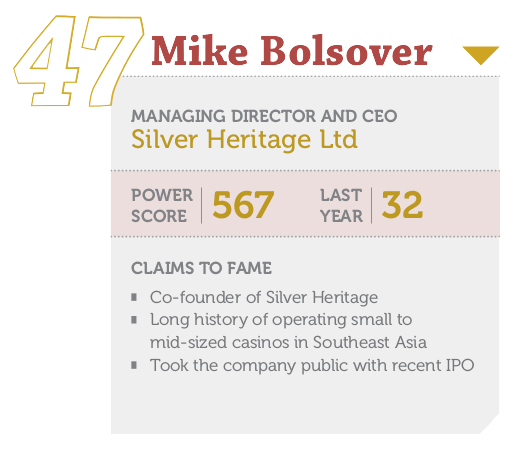
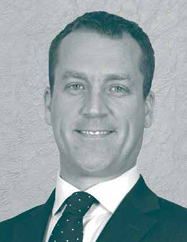
Having enjoyed steady growth since its formation in 2003, with gaming interests in Nepal, Vietnam, Laos and Cambodia, it seems the long-term future of Silver Heritage rests on the Nepal/ India border.
The only foreign operator to be granted a gaming license since ownership rules were relaxed less than two years ago, Silver Heritage has already begun construction of the five-star Tiger Palace Resort in Bhairahawa – due to open early next year and the first of two resorts planned for the region. In their sights is the untapped Indian market, with the company noting, “Over 430 million Indians live within a day’s drive of the Nepal border and entry to and exit from Nepal is visa-free for Indian nationals.”
Under the watchful eye of co-founder Mike Bolsover, Silver Heritage began listing on the Australian Securities Exchange after it launched an AU$25 million IPO in August, aiming to raise around AU$50 million to put towards the completion of Tiger Palace Resort.
The company already has strong ties to Nepal, having secured approval from the government in January 2015 to run the Shangri-La casino at the Shangri-La Hotel & Resort in Kathmandu.
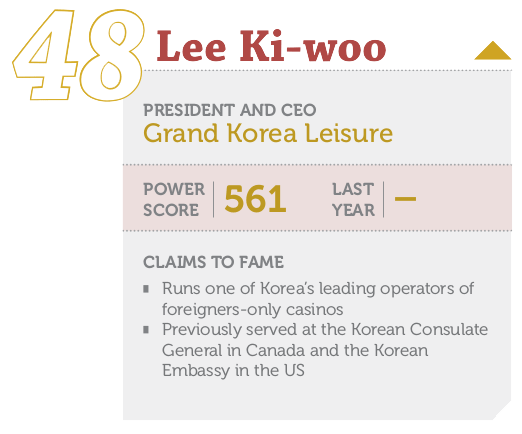
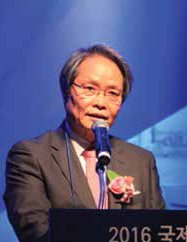
Exactly what the future holds for the government-affiliated Grand Korea Leisure (GKL) is open to debate, but there is no doubt the wind has been knocked out its sails over the past 12 months.
A subsidiary of the Korea National Tourism Organization, GKL was established in 2005 to promote tourism and raise funds, opening a number of foreigners-only casinos under its Seven Luck brand. For the most part the plan has worked, with GKL one of two companies – alongside Paradise Group – to dominate market share with around 90% between them.
But cracks began to appear last June when six GKL employees were arrested in China for allegedly marketing the company’s casino operations to Chinese gamblers. While Paradise was also caught up in the scandal, the fact that GKL has government ties didn’t sit well with their primary market.
How much this impacted the company’s decision last November not to bid for one of two new licenses issued earlier this year for integrated resorts in Incheon is unknown.
It does, however, suggest its gaming ambitions are limited. Quite a time for Lee Ki-woo, who took over from Lim Byoungsoo as GKL’s President and CEO just a few weeks later, to come on board!
With three IRs set to open in Incheon between 2017 and 2019, time will tell whether Korea’s 16 current foreigners-only casinos suffer the consequences.
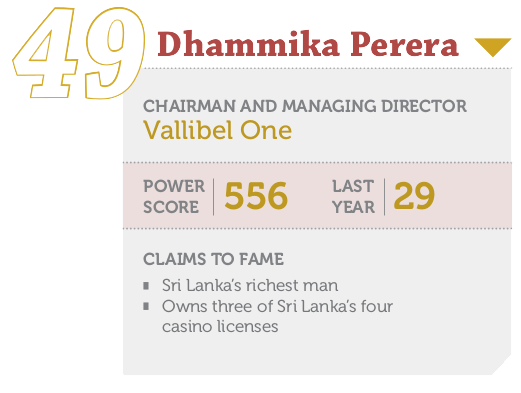
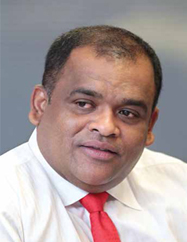
It’s a good thing that his casino operations comprise only a tiny percentage of Dhammika Perera’s vast fortune. Sri Lanka’s richest man already owns three of the nation’s four casino licenses and had positioned his holding company, Vallibel One,to take advantage of former President Mahinda Rajapaksa’s plan to improve tourism by issuing three new licenses for integrated resorts.
But that plan was knocked on the head when Rajapaksa was defeated at the January 2015 election. Unlike his predecessor, new President Mithripala Sirisena brought with him a fierce anti-gambling policy and quickly confirmed there would be no new IRs built –including Perera’s US$300 million Queensbury proposal.
Adding insult to injury, Sirisena has also introduced a US$100levy on all people entering Sri Lanka’s casinos, including foreigners who comprise the vast majority of customers. And just a few months ago he confirmed that there would be no new investment in casinos in Sri Lanka allowed under his watch.
In the meantime, Perera will no doubt carry on with his endless array of business interests but any dreams of expanding his local gaming empire appear to be on hold for now.
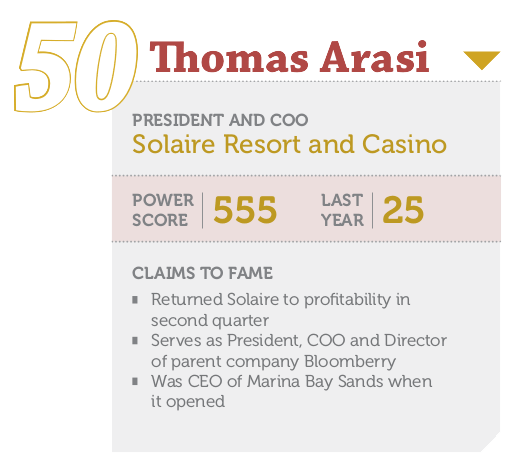
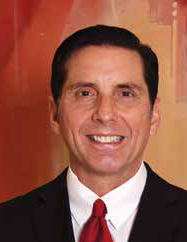
After five consecutive losing quarters, Bloomberry Resorts returned to profitability in the second quarter, thanks to improved performance at Solaire, the Philippines private casino market leader. Thomas Arasi has taken Solaire to the top after joining in late 2013 – seven months after Entertainment City’s first integrated resort opened.
In late 2014, Solaire took the market lead from Resorts World Manila as it rolled out Sky Tower with 312 boutique suites, 10 new VIP salons, a Broadway style theater, luxury retail and more, bringing key count to 800, gaming tables to nearly 400 and machines above 1,800. In last year’s aftermath, Solaire’s interest expense and depreciation increased while gaming revenue growth slowed to 5%, gutting EBITDA by 49% to P5.2 billion (US$111 million) and turning 2014’s P4 billion profit into a P3.4 billion loss.
In the first half of this year, featuring a torrid second quarter, Solaire has returned to profitability, setting records in EBITDA – up 60% to P5.3 billion, surpassing 2015’s full year total – gaming and non-gaming revenue and volume in all gaming segments. The entire Manila market is up, with a comeback in Chinese visitor arrivals, but management initiatives implemented by Mr Arasi and his team have amplified base trends.























